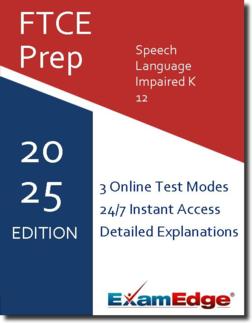FTCE Speech-Language Impaired K-12 (042) Practice Tests & Test Prep by Exam Edge - Blogs
Based on 34 Reviews
- Real Exam Simulation: Timed questions and matching content build comfort for your FTCE Speech-Language Impaired K-12 test day.
- Instant, 24/7 Access: Web-based FTCE Speech-Language Impaired K-12 practice exams with no software needed.
- Clear Explanations: Step-by-step answers and explanations for your FTCE exam to strengthen understanding.
- Boosted Confidence: Reduces anxiety and improves test-taking skills to ace your FTCE Speech-Language Impaired K-12 (042).



